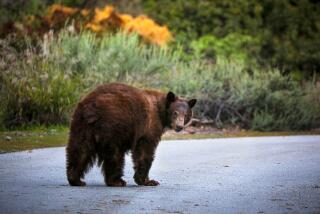Conservationists Aim at Big-Game Hunters
When about 250 men met in early December in Newport Beach to honor one of their own with an award for lifetime achievement, there was no doubt of their exclusive standing.
They were all big-game hunters and vehemently proud of their pastime, despite traditional disputes with wildlife conservationists who claim that they are bloodthirsty killers masquerading as sportsmen.
The hunters came from across the United States for the presentation of the 32nd annual Weatherby Big Game Trophy to Robert Kubick of Anchorage, Alaska.
The criteria for the award are rigorous. The winner must have record-setting species of several animals from all six continents. The lifetime total kill is critical. The difficulty in securing the specimen and its rarity are key considerations.
6 Nominated
The awardâs sponsor said fewer than 20 men in the world might merit serious consideration for the award, while only six are nominated each year based upon their achievements.
By contrast, there are an estimated 18 million hunting licenses renewed annually in the United States. So the sphere of the serious big-game hunter is truly microscopic.
But most experts agree that the total is far greater in 1988 than in 1887, when Theodore Roosevelt created a scoring system to evaluate big game and a foundation âto promote manly sport with a rifle (and) work for the preservation of the large game in this country.â
âI think more people are able to (hunt big game) today, simply because there are more wealthy people,â said Ed Weatherby, president of the company that bears the family name and manufactures some of the most elaborate firearms and scopes available.
âItâs easier to get to Africa than it ever was in Theodore Rooseveltâs day.â
Scoring System
He said the largest body of worldwide hunters is the 20,000-member Safari Clubs International based in Tucson. The organization has established its own scoring system to evaluate big-game trophies and distributes a substantial portion of membership fees to wildlife conservation efforts.
But while other conservationists have had trouble digesting the huntersâ philosophy ever since Roosevelt laid down his ideals, Weatherby said there is no hypocrisy in the creed.
âIt might sound like a contradiction, but itâs not,â Weatherby said. âThe hunter takes very few animals compared to the natural course of nature.
âTo give one example, a lion or a leopard in Africa may kill an impala once every other day, and if you multiply that by all the lions over the course of a year, you realize that within the same block of land, there might be only half a dozen hunters who might take one animal each. So it is very controlled.â
Hunters Restricted
Hunters are also restricted in any given case to shooting only the largest animal, which Weatherby said is almost always the oldest and weakest of the breed.
The fees they must pay for bagging their trophies--which hunters surveyed said can run as high as $40,000 for some breeds of foreign bighorn sheep--are always channeled directly into wildlife conservation efforts.
The sheer expense of those fees, all involved with the sport agree, virtually acts as a stopgap measure against the uncontrolled slaughter of game animals.
âI think we are witnessing a trend similar to whatâs been happening in Europe, where hunting has become a sport for those who have the time and the money to participate,â Weatherby said.
Nevertheless, the backlash against hunters has been manifest in several ways.
Hundreds of Protesters
C. J. McElroy, the president of Safari Clubs International and a former Weatherby trophy winner, was met by several hundred protesters in 1987 when he opened his own museum in Tucson built around the kills he had accumulated.
The harsh reaction surprised his guests, which included many of his hunting peers.
âI would say there were 300 of them, many of them calling out âMurderers! Murderers!â at us,â said Bruno Scherrer, 56, a Brentwood businessman with more than four decades of his life devoted to hunting.
âI never expected there would be such backlash,â Scherrer said. âSome of them were so angry, they started throwing rocks. It was frightening.â
McElroy refused to comment about the incident or about his sport.
âIâve received enough publicity,â he said. âI have nothing left to say.â
Meanwhile, confrontations continue and have extended into popular hunting grounds.
Along the eastern Mojave Desert in California, a running battle evolved in December between hunters of the local bighorn sheep and a group of 30 activists who called themselves the âHunt Saboteurs.â
The Saboteurs traveled to the border town of Baker from as far away as San Jose, Santa Cruz, San Diego and Los Angeles specifically to disrupt anyone setting aim on the sheep.
Annual License
The hunters are annually licensed to pursue the sheep by the California Department of Fish and Game. But the Saboteurs claimed that there was âcorruption inherent in the (Department of Fish and Game) management structureâ for allowing the practice.
âThey say they are siphoning off the sick and the oldâ sheep, said Rick Bernardi, a Saboteur from San Jose, Calif. âBut trophy hunters always go for the strongest and most magnificent animal, not the weak.â
Bernardi said that within a week of his groupâs arrival there were several showdowns with hunters, including one in which a hunter fired warning shots to keep the protesters away.
âThey werenât shooting to kill,â Bernardi said, âbut they left no doubt of their intentions in scaring our members off.â
Confrontation in Field
Bernardi said he was chased by a helicopter and all-terrain vehicles to keep him separated from a hunting party.
Both the California Highway Patrol and Department of Fish and Game denied a helicopter was anywhere near the desert hunting ground when the Saboteur claimed that he was chased.
âBut last year was worse,â Bernardi said. âSomeone got punched and the hunters threatened to kill him.
âIt can get dangerous out there, but a lot of us have the feeling that we are willing to risk our lives to save the sheep. They are willing to step between the gun and the sheep.â
Hunters bristle at the suggestion they are indiscriminately destroying breeds of animals. The privilege of hunting--especially in foreign countries--is often granted out of necessity, said another past winner of the Weatherby trophy.
âA Basket Caseâ
âSure, thereâs controversy, but keep the hunter out of it,â said Thornton Snider, 71, from Turlock, Calif. âAfrica is practically a basket case, and those people, the only thing theyâve got to sell in many cases is the game.
âItâs no different than the cattleman. They have nothing, and itâs a source of great income for nations like Zambia, Tanzania, Ethiopia and Zimbabwe.â
Snider said some of the more turbulent African nations, including the Sudan and Mozambique, are hurting on two different fronts because of political strife.
He said armed citizens of those countries are now slaughtering animals themselves without consideration of profits lost (on hunting licenses), or of random elimination of some species, including the female and the strongest of the young.
âNo Controlâ
âThere is no income and no control,â Snider said. âIt would be the same as taking all the game wardens out of the United States.â
Scherrer said the laymanâs image of hunters has also been confused with those of poachers, who have scoured Africa for both elephant tusks and rhinoceros horns.
âI have heard there are no elephants left in Kenya,â Scherrer said. âIt was once the No. 1 safari country in the world, but they have stopped all hunting there since 1977.
âThis is not because of the hunters. It is because of the poachers. And in the case of the black rhino, it is now on the endangered species list because they have sold (horns) to many Asian countries, where people believe the ground-up horn is an aphrodisiac.â
Disagrees With Critics
One clinical psychologist who is familiar with the standards and practices of big-game hunters said she cannot agree with the sportâs critics.
Dr. Marilyn Ruman, based in Encino, said she has seen the modus operandi of several hunters during her own photo safaris in Botswana, Zambia, Zimbabwe, Ruwanda and Kenya. The charges made by groups such as the Hunt Saboteurs, she said, are groundless.
âThe big-game hunter is a highly competitive individual playing a game that is restricted to few people,â Ruman said. âIn fact, to play the game, this is a very select tribe, playing something of an intricate chess game.
âItâs a game played by the same men who enjoy any game that is strategic and privileged. You are looking at men competing at the very highest level of competition, not just somebody who goes out and shoots game.â
âThe Least Threatâ
Ruman said she held the same prejudices against hunting until she saw the process actually carried out.
âThe big-game hunters make a very convenient target, but they . . . are the least threat,â Ruman said. âUnfortunately, they make the biggest target, because many of them come off in a privileged way and donât make very good spokespeople for themselves. People donât have much sympathy for them.
âBut if we engaged in war on the same basis that these men hunt animals, there would be very few people killed.â
More to Read
Sign up for Essential California
The most important California stories and recommendations in your inbox every morning.
You may occasionally receive promotional content from the Los Angeles Times.










